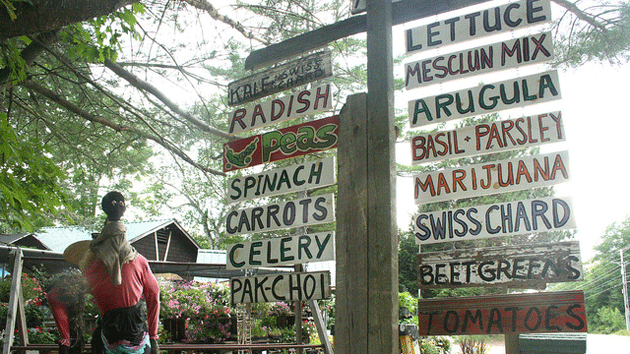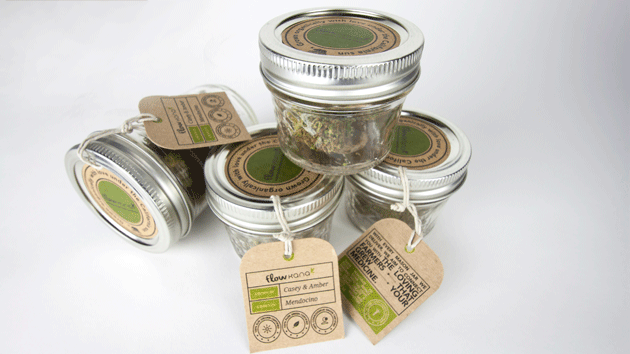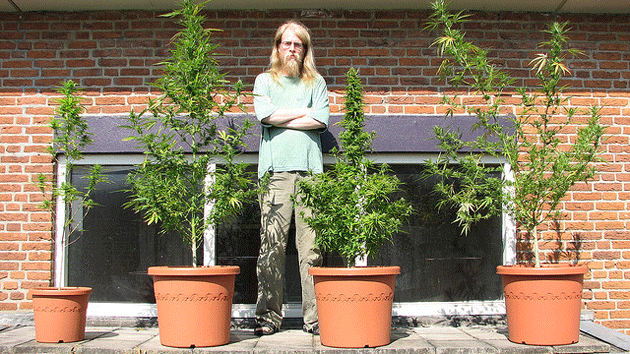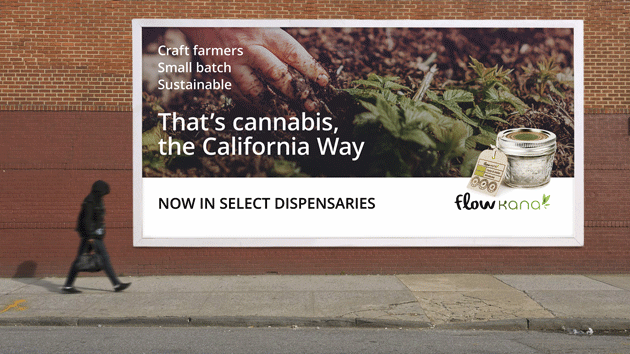
A mock-up of an ad that will appear this week on Bay Area newspapers, billboards, and busesFlow Kana
On Monday, just in time for 4/20, residents of San Francisco, Oakland, and Berkeley will witness the nation’s first multichannel marketing campaign for an actual brand of pot—a campaign that should be instantly recognizable to any bearded, Blue Bottle-drinking hipster: “Craft farmers, small-batch, sustainable,” say ads that will appear in newspapers and social media and on billboards and buses. “That’s cannabis the California way.”
The ads are paid for by Flow Kana, a collaborative of small, organic marijuana farmers from Northern California’s rugged and remote Emerald Triangle region. The campaign features scenic shots of the region’s mist-shrouded hills, home to many of the state’s original hippie growers and their descendants. It’s one of several marketing efforts recently launched to promote small farmers in the face of the increasing corporatization and vertical integration of California pot.
California will vote on a legalization initiative in November, but unlike other states that permit the sale of recreational marijuana, it already has a world-famous cannabis industry. The pot trade by far dwarfs all other sectors of the economy in the Emerald Triangle’s Humboldt, Mendocino, and Trinity counties. In fact, voters there have historically opposed legalization for fear that it would expose them to competition from venture-backed corporate farms—fears that have resurfaced with this year’s legalization initiative.
Except this time many Emerald Triangle farmers see an opening. Months of vigorous lobbying by their trade organization, the California Growers Association, has tailored this year’s leading legalization initiative to their interests. The Adult Use of Marijuana Act will initially restrict the size of legal pot farms to one acre and prevent any single entity from simultaneously cultivating, manufacturing, and retailing marijuana. It’s the opposite of the approach taken in other legal-pot states, which typically control the market by limiting licenses to large, vertically integrated growers. “It was critical to us that we be horizontally integrated and have the opportunity for lots and lots of small licenses,” says California Growers director Hezekiah Allen. “And that’s what we got.”
Up to a point. After the first five years, the law’s size limitations would expire, potentially opening the door to massive dispensary chains supplied by their own 100-acre Central Valley farms—what Allen describes as his “doomsday scenario.” If that were to happen, Allen believes that most of the Emerald Triangle’s 25,000 or so growers would simply return to selling cannabis on the black market, shipping it to buyers in states where it’s still illegal and fetches higher prices. With the spread of legalization to other states, Emerald Triangle growers might eventually go the way of Appalachian moonshiners, rendered irrelevant by a regulated marketplace.
Hence Flow Kana’s advertising campaign, which is aimed at convincing consumers to pay a premium for sustainably grown artisanal marijuana. “I think that evolution will take time, just like it did with cacao and coffee products,” says Flow Kana founder Michael Steinmetz Mishkin. Yet the evolution isn’t happening as fast as he’d like: “If we don’t get this company to be massively big over the next two years,” he adds, “then we won’t be able to compete with the bigger forces that come in. So we are going all out.”
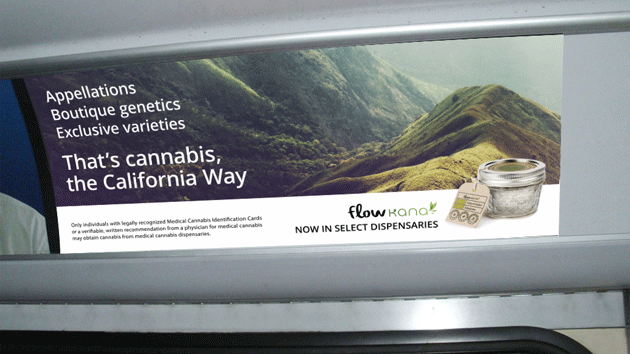
Flow Kana is spending about $200,000 on the marketing effort, which also includes a series of videos and a sponsorship deal with San Francisco’s Earth Day Film Festival. Other similar efforts are also underway. Cooperatives such as Humboldt Sun Growers Guild and Emerald Family Farms sell responsibly grown, “mom and pop” marijuana under their own brands in medical-pot dispensaries, though their advertising efforts to date have mostly been limited to stoner magazines.
In response to increasing concerns about marijuana’s environmental costs, many California pot dispensaries offer their own lines of (informally) organic, sun-grown pot. Yet few will say exactly where it came from. That used to suit farmers, who feared any exposure could lead to their arrest, but the practice is now being seen as anti-competitive. Growers complain that an increasing amount of dispensary marijuana is grown in-house as a cost-cutting measure. “They want to control the market,” says Chrystal Ortiz, the operations manager of Humboldt Sun Growers. “From a financial standpoint, it’s not in their best interest to allow a brand because then we can set a price.”
By bringing yeoman growers out of the shadows, the new pot brands aim to empower them. “Right now in the black market, if you grow organic and under the sun with love and care, or you grow it in the basement, you get treated in the same way,” Mishkin says. “The idea with this campaign is to really showcase who we are, and in so doing create a value for customers that will trickle down for the benefit of the planet.”
The concept is in many ways a return to the Emerald Triangle’s hippie roots, albeit with a modern marketing sensibility. “It’s not like we have to go out and recreate these systems,” Mishkin says. “We just have to leverage the people who have been doing it.”

